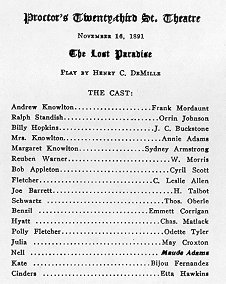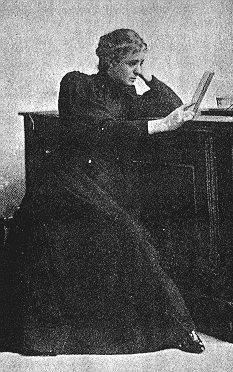
The Lost Paradise

The play opened Nov. 16, 1891 at Proctor's 23rd St. Theater. The play was by Henry C. DeMille. Maude Adams played Nell. Maude played the part of Nell, a crippled factor drudge who is secretly and hopelessly in love with the superintendent.
"Adaptation of a German play about a conflict between a wealthy, Boston iron-works owner and his exploited workers, a labor struggle set within the framework of a love story involving the owner's spoiled daughter and the conscientious superintendent of the works who supports an employee strike."" (Maude Adams, an American Idol: True Womanhood Triumphant in the Late-Nineteenth and Early-Twentieth Century Theatre, doctoral thesis, 1984, Eileen Karen Kuehnl)
=====From the Acton Davies book=====
Belasco had taken her measure, and Frohman had been particular in asking that the new play should contain a role which would give her an opportunity. The result was Nell, the lame girl, in The Lost Paradise, a charming role, which showed for the first time what Miss Adams could do in the way of pathos.
From the book Charles Frohman:" Manager and Man by Issac F. Marcosson and Daniel Frohman, with an Appreciation by James M. Barrie. 1916:
(...)In "The Lost Paradise" Maude Adams scored the biggest success that she had made up to that time in New York. She played the part of Nell, the consumptive factor girl. This character, with its delicate and haunting interpretation, made an irresistible appeal to the audience.
"There's big talent in that girl," said Frohman in speaking of Miss Adams. He began to see the visions of what the years would hold for her. Charles Frohman:" Manager and Man by Issac F. Marcosson and Daniel Frohman, with an Appreciation by James M. Barrie. 1916
=====The Bishop of Broadway: the Life & Work of David Belasco by Craig Timberlake; Library Publishers, 1954=====
And it was. Like its predecessors, Men and Women enjoyed a long run, remained in the repertory of stock companies until after the turn of the century and ultimately provided grist for the voracious motion picture mills. De Mille and Belasco no doubt found riches and ruin a welcome change from past experience. After Men and Women they parted company amicably because they had little else to say in duo, and Belasco was absorbed in the very special problem of making Mrs. Leslie Carter "an emotional actress." De Mille went on alone to the successful adaptation of The Lost Paradise from the German of Ludwig Fulda. Economist Henry George was his chief inspiration, and the reading of Progress and Poverty prompted The Lost Paradise and converted De Mille and his wife to the "single tax" and other Georgian theories. In 1893 De Mille fell ill while attending the premiere of a Belasco play at the opening of Charles Frohman's Empire Theater. Typhoid fever developed shortly thereafter and he died before his fortieth birthday. Two sons, William C.. and Cecil B.,, collaborated briefly with David Belasco early in their careers before leaving New York to emblazon the name of De Milleacross the flashing night skies of filmdom's capital.
=====American Theatre: A Chronicle of Comedy and Drama, 1869-1914 by Gerald Bordman; Oxford University Press, 1994=====
Henry C. de Mille enjoyed one final success when Charles Frohman produced his version of Ludwig Fulda 's Das verlorene Paradies as The Lost Paradise ( 11-16- 91), 23rd St.). Reset in America, it recounted how Andrew Knowlton ( Frank Mordaunt), a rich Boston industrialist, hands over his factory's day-today operations to his trusted, warmhearted manager, Reuben Warner ( William Morris), in order to devote his time to his daughter, Margaret ( Sydney Armstrong). His hope is that she will wed Ralph Standish ( Orrin Johnson), an arrogant young man whom Knowlton has taken in as a partner. When a strike explodes at the factory, Knowlton is shocked to discover that first Warner, then Margaret side with the strikers. She announces, "Amid all the selfish arguments, there comes to my soul the voice of God, crying for mercy upon His poor. I heard it in the grinding of the machinery over at the factory. I recognized it in the cries of these people for bread. And to-day I heard it again by the bedside of sickness, in the homes of wretchedness." She consents to marry Warner, who had learned in the first act that he had invented the device that had helped Knowlton become so wealthy but who has kept quiet to spare Margaret's feelings.
Growing sympathy with the plight of many laborers earned this speechy yet gripping play favorable notices. While all the performances were praised, several critics singled out the acting of little Maude Adams in the small role of Nell, the hungry, hope denied child worker, who has been crippled in a factory accident ("I can't do much hard work since that steel bar came down on my foot") and who knows that Warner will never reciprocate her love for him ("I saw the look in his eyes. He loves her. She's beautiful, and her frocks ain't all patched up like mine."). Special commendation also was given the factory set, with its huge, cumbersome machinery noisily grinding away and shrill steam whistles adding to the din. The production recorded 138 performances. Seekers of trivia may delight in the play's use of a one-sided telephone conversation at the start of the first act for expository purposes. This may be the earliest such employment of what soon became a clich.
Reviews
She was “touchingly pathetic, according to the New York Sun of Nov. 17, 1891.
The Dramatic Mirror of Nov. 21, 1891, termed her performance “exquisite
“No one could forget the pathetic picture of Maude Adams as the hungry, half-frozen factory girl-a performance that at once raised Miss Adams to the higher ranks. Annals of the New York Stage, George Odell, 1927-1949
=====The Plays of Henry C. de Mille by Robert Hamilton Ball, David Belasco; Princeton Univ. Pr., 1941=====
The Lost Paradise opened in New York at Proctor's Twenty-third Street Theatre on November 16, 1891, reached its one hundredth night on February 2nd, and ended its run on March 5th. Among the many fine performances, it is worth noting that this was Maude Adams's first decisive New York success:
ANDREW KNOWLTON=FRANK MORDAUNT
REUBEN WARNER=WILLIAM MORRIS
RALPH STANDISH=ORRIN JOHNSON
BOB APPLETON=CYRIL SCOTT
FLETCHER=LESLIE ALLEN
JOE BARRETT=HENRY TALBOT
SCHWARZ=THOMAS OBERLE
BENSEL=EMMETT CORRIGAN
HYATT=CHARLES MATLACK
BILLY HOPKINS=C. BUCKSTONE
MRS. KNOWLTON=ANNIE ADAMS
MARGARET KNOWLTON=SYDNEY ARMSTRONG
POLLY FLETCHER=ODETTE TYLER
JULIA MARY=CROXTON NELL=MAUDE ADAMS
CINDERS=ETTA HAWKINS
KATE=BIJOU FERNANDEZ
"It is," said the Herald , "one of the few interesting works that we have seen in our day which treat a great and modern theme in a broad and earnest way. The theme is the great struggle between capital and labor. It was handled in a strong and human way by Herr Fulda, and Mr. De Mille has kept all that was good in the original version, supplementing it with humor of an honest kind and largely developing the love interest. . . . It deserves a long and prosperous career." That it unquestionably had. Another Frohman company opened with it in Boston in January 1892, before the conclusion of its New York run. It played nine New York theaters before the end of the century, several more in the next decade; it was produced in London in December 1892; in Chicago, it was still being acted in 1909, and in smaller cities stock companies no doubt continued to play it even later.

|